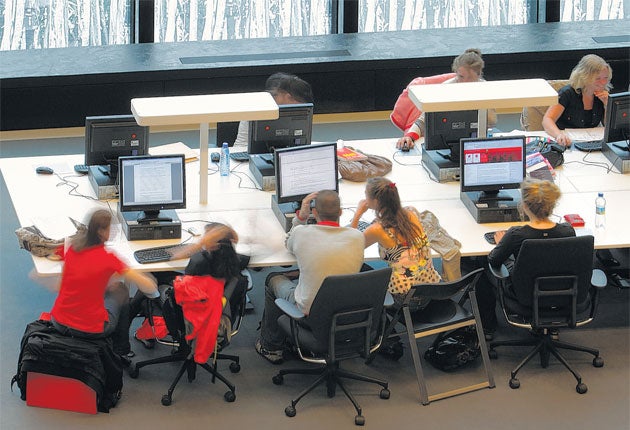The Netherlands: the hardest part is deciding what to study

Students planning to study for a Bachelors degree in the Netherlands have plenty of options. Despite the country’s diminutive size, it packs in 14 research universities, 39 universities of applied science and five university colleges, all of which combined to offer 1,095 degree programmes taught in English in the 2009-10 academic year, according to the Netherlands Organisation for International Co-operation in Higher Education (Nuffic).
Although the number of UK students studying in the Netherlands is still relatively small – only 1,250 out of more than 70,000 international students – they benefit from the Dutch higher education system’s international focus, particularly since most courses are taught exclusively in English. “There’s never been a language barrier to my studies,” says Dawn Williams, currently studying international business and management at the HAN University of Applied Sciences. “This is an international course, so any language other than English is forbidden in class.”
There are language components to many courses and students are encouraged to learn Dutch to broaden their cultural education, but universities place a great deal of emphasis on a high standard of written and spoken English, putting UK students at a significant advantage. With no language barrier to worry about, the challenge is to decide which kind of institution to study at, and what subject to focus on once you arrive.
Courses and their content vary hugely in the Netherlands, with much depending on the type of institution you attend, whether that’s a research university, university of applied science or university college. Courses at research universities generally last between three and four years, with an emphasis on theoretical knowledge and debate, as well as a broad approach to the subjects in question.
Research institutions include the universities of Amsterdam, Groningen and Twente, all of which offer a selection of programmes taught in English. At Twente, students can choose from Bachelors courses in creative technology, advanced technology, European studies or international business administration, for example, while Groningen offers Bachelors degrees in American studies and international relations, as well as courses in psychology, law and more.
At universities of applied science, the approach is slightly different, biased more towards preparing graduates for employment in specific fields. “We offer courses that prepare students for professional life,” says Sjoukje Elsma of Inholland University of Applied Science. “It’s good for students, because they’re getting both practical and theoretical training. After graduation they’ll already know and understand the world of work.”
Courses at Inholland include aeronautical engineering, leisure management, and marketing. Again, Bachelors programmes last between three andfour years and usually incorporate some kind of internship or option to study abroad. “We have a lot of connections with business and industry, it’s a very important part of our curriculum,” says Elsma.
While both research and applied science universities offer a wide range of options, those looking for even more flexibility might want to investigate one of theNetherlands’ university colleges.
Found in Middelburg, Amsterdam, Leiden, Maastricht and Utrecht, these institutions takeaninterdisciplinary approach to learning. Students effectively design their own three or four year course from a broad list of options and canchoose to major in the humanities, sciences or social sciences, while still pursuing other areas as a minor element to their programme. “We offer an international liberal arts and sciences programme that crosses the boundaries of languages, cultures and academic disciplines,” says Mariette Diderich of Amsterdam University College. “Discussions start from the ‘big questions’ in science and society and lead to in-depth study in a wide range of disciplines.”
Although courses and assessment methods (which might include exams, final theses and coursework) vary between institutions, a common theme is the approach to teaching. Throughout the Netherlands, sometimes in conjunction with more traditional methods, such as lectures and seminars, problem- or project-based learning is widely used to instruct students.
This involves assigning students specific tasks or questions to research independently or within small groups, and is intended to develop analytical skills and self-discipline. The concept also encourages communication between students and lecturers. “Students tell us they have good experiences,” says Sandra van Beek of Hogeschool Utrecht. “They say they’ve learned so much more than they would from just reading a book.”
For UK students studying in the Netherlands, beyond the Bachelors qualification lies employment, or perhaps further study to Masters or Doctorate level – but also the prospect of less student debt. With tuition fees currently at €1,672, it’s easy to imagine the number of international students from the UK rising. However, what’s more valuable is the experience of studying abroad, says Elsma. “Most students come here to have an international adventure. They come for the international environment.” The British students in this small country have a big opportunity, it seems.
“We teach students to co-operate with people of many different nationalities. We’re preparing them to live in a global society.”
Join our commenting forum
Join thought-provoking conversations, follow other Independent readers and see their replies
Comments
Bookmark popover
Removed from bookmarks